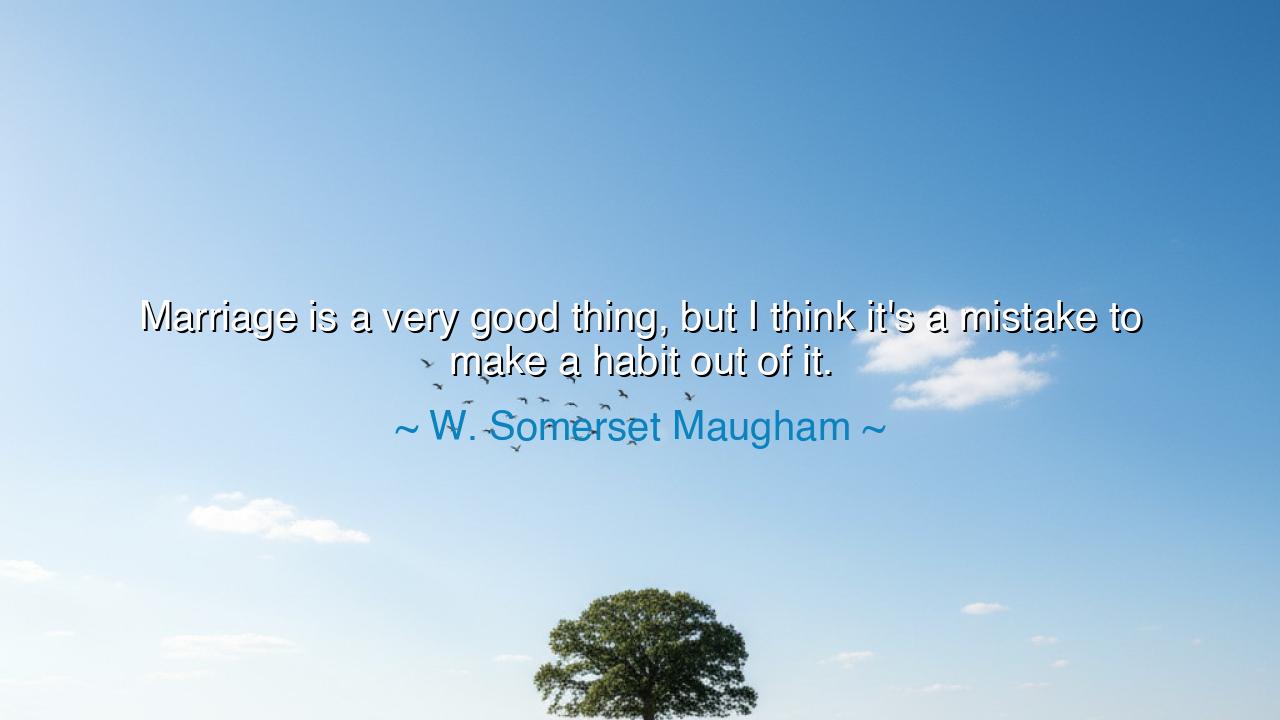
Marriage is a very good thing, but I think it's a mistake to make






In the wry and timeless words of W. Somerset Maugham, the great observer of human nature, we hear both wit and warning: “Marriage is a very good thing, but I think it’s a mistake to make a habit out of it.” Beneath the humor lies a depth of reflection that only experience can teach. Maugham, who wrote of the follies and passions of humankind with both affection and irony, was not mocking marriage itself, but the human tendency to repeat life’s greatest commitments without reflection. His words remind us that sacred vows lose their sanctity when treated as routine, and that what is meant to be a union of souls can become mere ceremony if entered into carelessly or too often.
The origin of this quote rests in the life and character of Maugham himself—novelist, playwright, and traveler of both the outer and inner worlds. He lived through an age when social conventions demanded conformity, yet he was too honest, too observant, to ignore the contradictions of human desire. Through works like Of Human Bondage and The Razor’s Edge, he explored the fragile balance between love and freedom, duty and longing. When he said that marriage should not become a habit, he spoke as one who understood both the beauty of companionship and the tragedy of its misuse. To him, marriage was not to be despised—it was to be revered, and therefore not multiplied without thought.
From the dawn of civilization, marriage has been regarded as sacred—a covenant between two souls, blessed by gods or sealed by law. But like all sacred things, it requires reverence to maintain its power. The ancients understood this. In the myths of Greece, when Zeus grew restless and sought the company of many, his infidelities brought chaos not only to his home but to the heavens. The gods themselves warned through their stories: that love treated lightly brings ruin. Thus Maugham’s quip, though modern in its wit, echoes an ancient wisdom—commitment must be entered with awe, not as habit, not as sport, but as a vow that carries the weight of eternity.
There is a subtle heroism in his insight. For Maugham recognized that human beings are drawn by both the comfort of companionship and the hunger for novelty. He saw how men and women, chasing after the illusion of new love, often confuse excitement for meaning. They marry again and again, mistaking the fire of the beginning for the warmth of endurance. But passion, however bright, is fleeting if not grounded in the soil of patience and understanding. Maugham’s words remind us that to make marriage a habit is to chase the shadow of love rather than its light. One may marry many times, yet never truly love once.
Consider the example of King Henry VIII, whose restless pursuit of marital satisfaction left not only broken hearts but a fractured kingdom. Each new marriage promised fulfillment, yet each ended in disappointment or blood. In seeking perfection through repetition, he destroyed the sanctity of what he sought to possess. His story stands as a warning through time—that love cannot be renewed through novelty alone, and that to treat the sacred as ordinary is to invite sorrow. Maugham, who knew history and the depths of the human heart, distilled this lesson into a single line of irony and truth.
At its heart, the quote is not cynical, but reverent. Marriage, Maugham suggests, is “a very good thing” precisely because it is rare, deliberate, and profound. It is meant to be an act of creation—a joining of two lives in a union that mirrors the harmony of the cosmos. When it becomes a habit, when one treats it lightly or repeatedly, the divine spark within it dims. Like a word repeated too often, it loses its meaning; like a sacred vessel handled carelessly, it cracks. Maugham’s humor conceals a moral truth: that to honor love, one must treat it as precious, not as a pastime.
The lesson for us, then, is this: do not turn sacred commitments into habits. In love, as in all things of the heart, quality matters more than quantity. To love deeply, faithfully, even once in a lifetime, is worth more than a thousand fleeting unions. When you give your heart, give it as though it were your only treasure, not a coin to be spent again and again. Let marriage—or any vow of love—be a choice made with wisdom, patience, and devotion, not impulse or vanity. For true love, once chosen and nurtured, is eternal in a way that repetition can never be.
So, to those who walk the path of love, let Maugham’s words serve as a lantern: cherish what is good, but do not diminish it by excess. Enter into union not out of habit, but from the fullness of your being. Love once, love well, and love wisely. For in doing so, you will find that the “very good thing” Maugham spoke of need not be repeated to be complete—it need only be honored, with all the reverence the heart can hold.






AAdministratorAdministrator
Welcome, honored guests. Please leave a comment, we will respond soon